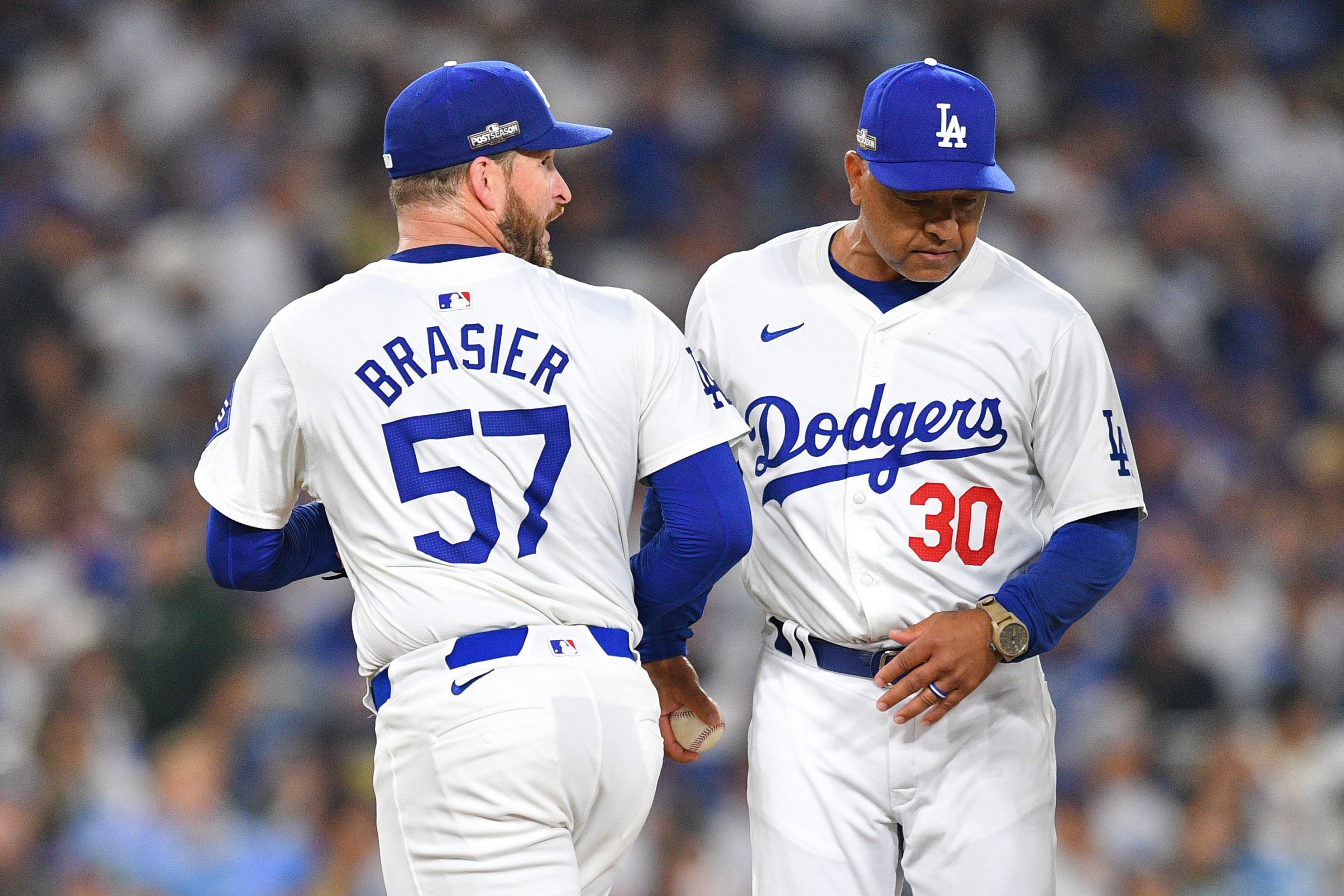It is difficult, even the morning after, to know how to view the Los Angeles Dodgers' 8-0 shutout of San Diego in Game 4 of the National League Division Series. Was it an homage to the power of desperation? The triumph of an efficient system over individual excellence? Plain dumb luck replayed eight times in succession?
However you assign motive, let alone value, the Dodgers performed the rarest of feats on Wednesday night when they tied up their series on the strength of an eight-pitcher shutout. Rarer still, only one of those eight, Alex Vesia, faced more than five Padres hitters. Vesia was stretched out over the fourth and fifth innings in a 30-pitch marathon that had oldey-timey rememberers sighing over the recent death of Luis Tiant, the wonderfully idiosyncratic pitcher who threw a 155-pitch complete game in the 1975 World Series, three days after pitching a complete game shutout, all at age 34 and while celebrating every win with a cigar the length and girth of an adult spaniel. But that was then. This is the very opposite of that.
Wednesday was a day to honor the concept of full employment, as 51 pitchers were used in that day's four games, including 15 in Detroit's 3-0 shutout of Cleveland earlier in the day—one fewer pitcher than baserunners, if you're scoring at home. The average starter lasted 2 2/3 innings, and almost all of that was by design. The Padres probably hoped to get more than 10 hitters of work out of ace Dylan Cease, but he was working on short rest and got kicked around by the suddenly rampant Dodger lineup, which as we all know spells doom for anyone who doesn't live like Tiant.
I mean, it's not that pitchers can't do that any more if pressed. The point is that they are never pressed. There is no solution to a pitching problem that analytics experts and the managers they control believe can't be addressed with more pitchers, even though that risky strategy gets riskier with every pitching change. The odds are that at least one of the eight is going to be dreadful, and then where are you, other than screwed? In that sense, the Dodgers’ all-hands-on-deck shutout last night was a triumph against some serious odds.
It wasn't that long ago that there was one poor sap on every staff who would be called upon to eat up five innings in a blowout "to save the bullpen." That is now an extravagance; this year, 113 position players took the mound in lost causes, none of them Shohei Ohtani. It's just the thing you do these days.
And, in a sense, Dodgers manager Dave Roberts did the thing you do when you can't afford the crutch of the wily position player pitching—you empty your bullpen and hope for the best. He gathered the fellows before the game and explained how this was going to work; how he broke the news to Ben Casparius and Edgardo Henriquez that they wouldn't be any of the hands on deck is a mystery for another time.
But 37-year-old Ryan Brasier was, and 36-year-old Blake Treinen, and 37-year-old Daniel Hudson, who had pitched the day before, as well as more treaded tires like Anthony Banda and Michael Kopech (who aged plenty this year in his time with the White Sox), and the aforementioned Vesia, and putative closer Evan Phillips, and young'un Landon Knack, who closed the game out. It was a wall of arms, strategically laid out to navigate San Diego's knot of left-handed hitters, and the Padres could not figure out any of them.
“I think that’s one of the most annoying things,” Padres outfielder Jackson Merrill said afterward. “It kind of brings you back to Spring Training. You face one guy, and then it’s a new guy every time.” Very true, except that a B-game on the back field on February 27 doesn't have 44,000 people watching.
Merrill is a rookie, and he will learn more annoying things about baseball in the years to come. This was just Wednesday's annoying thing. Conversely, it was also a tactical tour-de-force for Roberts and pitching coach Mark Prior (yes, that Mark Prior), who mixed and matched their way through the vaunted Padres lineup. One would say that they did so "frantically," but one cannot frantically plan. It just looks frantic when you remember that the Dodgers have used a preposterous 40 pitchers to win their 100 games this year, including position players Kiké Hernandez and Miguel Rojas. The only team to use more, Miami, was aggressively trying to lose, and succeeding beyond their wildest dreams. They succeeded enough, in fact, to convince manager Skip Schumaker to use the opt-out clause in his contract to escape the sadness of it all. But that's for the 2025 MLB preview, coming soon.
The point being made here is that the Dodgers have been trying to steal and still may steal a World Series with elite hitters and Costco pitchers—decent quality, but sold in bulk. In some ways then, Wednesday's everybody-plays victory was the most enduring metaphor of the Dodgers season, even more than the Shohei-Mookie-Freddie-Teoscar Show, the perfect balance of Tiffany and Kirkland Signature.
And yet there's more, or at least there could be. The Dodger rotation is still in moderate tatters, and Roberts might have to bullpen Game 5 tomorrow night, too. His starting options are Yoshinobu Yamamoto and Jack Flaherty, but Yamamoto got hammered in Game 1 and Flaherty struggled in Game 2, and neither is the picture of health at the moment. In other words, 2014 Clayton Kershaw ain't comin' through that door. But everyone else apparently is.






